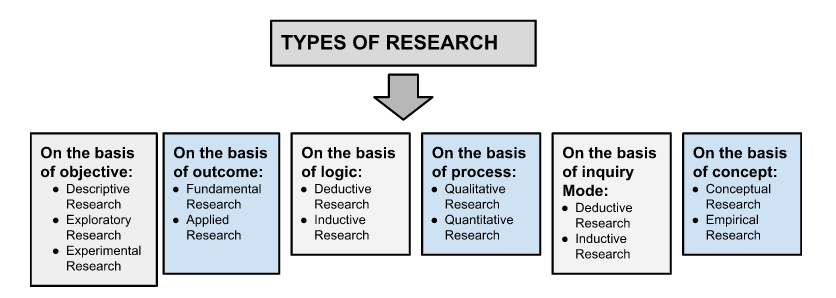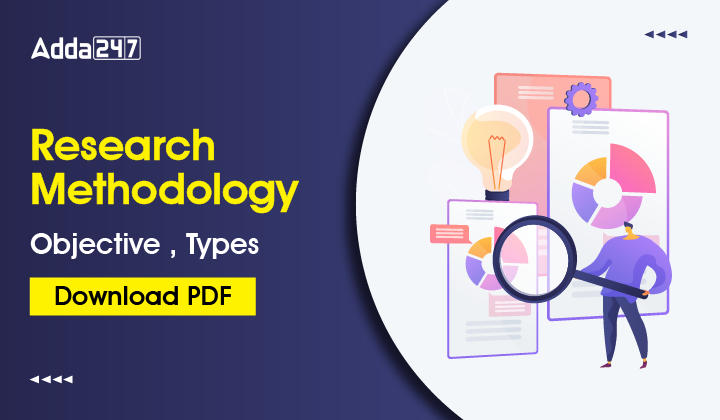Table of Contents
Research is a systematic inquiry or investigation conducted to gather and analyze information to advance knowledge, solve problems or answer questions. It can also be defined as the creation of new knowledge or the use of existing knowledge in a new and creative way so as to generate new concepts and understandings. In this article, we will discuss research and its allied concepts.
What is Research?
The term Research comprises two words “Re” and “search”. Generally “Re” means again and “search” means to find out. Research is a careful investigation or inquiry, especially to search for new facts in any branch of knowledge. Example: Research conducted on issues such as
- How the New Education Policy has evolved after independence?
- How the COVID-19 disease has impacted the Economy?
Research can be done with human beings, animals, plants, other organisms and inorganic matter. No matter what topic is being studied, the value of the research depends on how well it is designed and done. A good researcher must be hardworking, diligent, and open-minded, and should adopt a critical way of thinking.
Objectives of Research
Well-defined objectives of the research are an essential component of successful research engagement. Here are some of the following objectives given below:
- To generate new knowledge.
- To gain familiarity or to develop a new insight into some phenomenon.
- To investigate some existing situation or problem.
- To construct or create a new procedure or system.
- To explore and analyze more general issues.
- To investigate some existing situations or problems.
- To test a hypothesis or theory.
- To identify patterns or trends related to the problem.
Types of Research
Research is of different types depending upon several factors like objective, outcome and process etc. These are explained below

Based on Objectives :
- Descriptive Research: The main objective of descriptive research is to define the characteristics of a particular phenomenon. It is also known as statistical research. It deals with everything that can be counted and studied. This descriptive methodology focuses on the “what” of the research problem. The primary methods used in descriptive research include observations, surveys, and case studies.
- Exploratory Research: It is generally done at the beginning of the research. It attempts to clarify why and how there is a relationship between two or more aspects of a situation or phenomenon. It makes use of secondary data. The purpose of this is to gain background information, define terms, and clarify the problems.
- Experimental: This method begins with a question concerning the relationship between two or more variables. The independent variable is controlled by the researcher. And the dependent variable is measured by the researcher. The researcher manipulates independent variables example teaching methods and measures dependent variables (satisfaction) to establish cause-and-effect relationships between them.
Based on the outcome:
- Fundamental: It is also known as basic research. This research is driven by the desire to expand knowledge in a specific research area. This will increase our scientific knowledge base for research. It aims to say how things can be changed.
- Applied research: It is defined as research that is used to answer a specific question, determine why something failed or succeeded, and solve a specific, pragmatic problem.
Based on logic:
- Deductive: It is also termed a top-down or general-to-specific approach. It is a method of verification and instruction. And it does not provide any new knowledge. It aims at testing an existing theory. It involves three steps- state the hypothesis, collect data to test the hypothesis and lastly make a decision to accept or reject the hypothesis.
- Inductive: It is also known as the bottom-up approach. It gives new knowledge. It is a method of discovery and teaching. It involves three steps-observe different phenomena in the world, searching for a pattern in what is observed and lastly making a generalization about what is occurring.
Based on the process:
- Qualitative: this is a “subjective research” that explores and gains an understanding of the problems. The approach is bottom-up. It explores to know how and when. The main objective is to develop an understanding of human beings and social sciences to know what feel and think.
- Quantitative: This adopts an “objective” approach that explains and quantifies the problems. It is a top-down approach. The objective is to confirm what and when. This research is very clear on what to do, and what not to do by employing statistical, logical and mathematical techniques.
Based on inquiry mode:
- Structured: This approach is usually classified as quantitative research. It is more appropriate to determine the extent of a problem, issue or phenomenon by quantifying the variation.
- Unstructured: This approach to inquiry is usually classified as qualitative research. It allows flexibility in all aspects of the research process. It is more appropriate to explore the nature of a problem without quantifying it.
Based on Concept:
- Conceptual: It is focused on developing new ideas or theories, without necessarily collecting data. It involves the analysis of abstract concepts, theories, and ideas that are not observable or measurable. Conceptual research is often used to establish a theoretical framework for further research and to provide a basis for the development of new ideas and theories.
- Empirical: On the other hand, it is based on the collection and analysis of data. This type of research involves the observation and measurement of real-world phenomena, and the use of statistical methods to analyze the data. Empirical research is often used to test existing theories and hypotheses, to gather information on a particular topic, or to validate the effectiveness of a particular intervention or treatment.
In nutshell, research is a systematic and structured approach to answering questions or solving problems by collecting, analyzing, and interpreting data. It involves various types, steps, and ethical considerations to ensure the validity and reliability of the research findings. Research plays a crucial role in advancing knowledge, solving problems, and informing decision-making in various fields.
Research Methodology, Objective , Types , Download PDF
| UGC NET Study Notes Important Links | |
| UGC NET Study Notes for Paper 1 | UGC NET English Literature Notes |
| UGC NET Commerce Notes | |




 UGC NET Commerce Syllabus 2025 PDF Downl...
UGC NET Commerce Syllabus 2025 PDF Downl...
 UGC NET Teaching Aptitude Questions Answ...
UGC NET Teaching Aptitude Questions Answ...
 UGC NET Philosophy Syllabus 2025 PDF Dow...
UGC NET Philosophy Syllabus 2025 PDF Dow...




